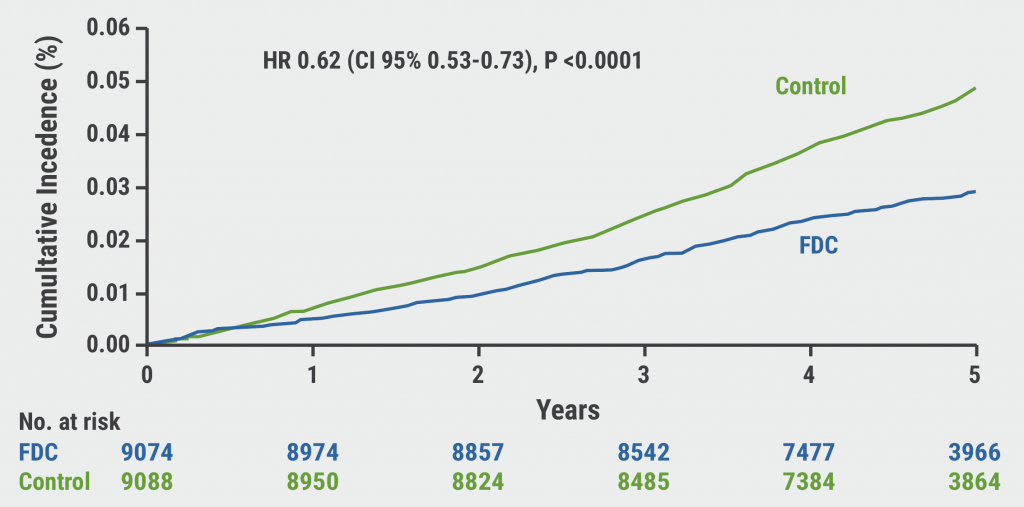https://doi.org/10.55788/c659a1ff
“I think many of us know that patients with CKD and diabetes have a high risk of hospitalisation for heart failure (HF) and cardiovascular death. In fact, patients who have both CKD and type 2 diabetes have a 3-fold risk of having HF compared with patients with diabetes alone,” explained Prof. Bertram Pitt (University of Michigan School of Medicine, MI, USA) [1].
The phase 3 FIGARO-DKD trial (NCT02545049) investigated whether the non-steroidal mineralocorticoid-receptor antagonist finerenone would reduce the cardiovascular risk in these patients [1,2]. After a run-in phase of 4–16 weeks, during which the renin-angiotensin system inhibition therapy of the patients was optimised, the study randomised 7,437 adults to finerenone 10 mg/20 mg daily or placebo. Among the inclusion criteria was an eGFR ≥25 ml/min/1.73 m², urine albumin-to-creatinine ratio (UACR) ≥30–≤5,000 mg/g and a serum potassium of ≤4.8 mmol/L. The primary endpoint was composed of cardiovascular death, non-fatal myocardial infarction, and hospitalisation HF. Secondary composite endpoints looked at a decrease in eGFR of ≥40% and ≥57% or renal death, as well as the development of end-stage renal disease.
The study cohort had a mean age of 64 years, a mean type 2 diabetes duration of 14.5 years with a mean HbA1c of 7.7% and included 31% women. All participants had a renin-angiotensin system blocker, 71% received statins, 48% β-blockers, and 51% calcium antagonists. Importantly, at least 60% of patients with a preserved eGFR had albuminuric CKD with a UACR of ≥30mg/g. Prof. Pitt reminded his colleagues not to forget to screen for UACR even when eGFR is normal.
The risk for the primary endpoint was significantly reduced in the finerenone arm of the study by 13%, demonstrated by a hazard ratio of 0.87 (95% CI 0.76–0.98; P=0.026). “I’d like to emphasise that this was primarily driven by a 29% reduction in hospitalisation for HF,” stated Prof. Pitt. The composite kidney outcome of a ≥40% reduction was non-significant (P=0.069). “However, the more reliable and classic endpoint, a greater than 57% reduction in eGFR, an endpoint that has been used in many renal trials, was significantly reduced and, most importantly for our patients, the progression to end-stage renal disease was also significantly reduced. So, significantly less dialysis and end-stage renal disease,” highlighted Prof. Pitt.
The overall adverse-event profile was balanced between the groups, but hyperkalaemia occurred about twice as often in the finerenone group (10.8%) compared with the placebo group (5.3%). Of note, only 1.2% of patients on finerenone had to discontinue the medication due to hyperkalaemia.
“Together, the results of FIGARO-DKD and the previous FIDELIO-DKD (NCT02540993) allow us to say pretty confidently: finerenone provides kidney and CV benefits across the spectrum of patients with CKD and type 2 diabetes,” Prof. Pitt concluded.
- Pitt B. FIGARO-DKD: Finerenone in patients with chronic kidney disease and type 2 diabetes. Hot Line Session, ESC Congress 2021, 27–30 August.
- Pitt B. N Engl J Med 2021;Aug 28. DOI:1056/NEJMoa2110956.
Copyright ©2021 Medicom Medical Publishers
Posted on
Previous Article
« 2021 ESC Guidelines on Heart Failure Next Article
Older hypertensive patients benefit from intensive blood pressure control »
« 2021 ESC Guidelines on Heart Failure Next Article
Older hypertensive patients benefit from intensive blood pressure control »
Table of Contents: ESC 2021
Featured articles
2021 ESC Clinical Practice Guidelines
2021 ESC Guidelines on Heart Failure
2021 ESC/EACTS Guidelines on Valvular Heart Disease
2021 ESC Guidelines on Cardiac Pacing and Cardiac Resynchronisation Therapy
2021 ESC Guidelines on Cardiovascular Disease Prevention
Best of the Hotline Sessions
Empagliflozin: First drug with clear benefit in HFpEF patients
CardioMEMS: neutral outcome but possible benefit prior to COVID-19
Cardiac arrest without ST-elevation: instant angiogram does not improve mortality
Older hypertensive patients benefit from intensive blood pressure control
Antagonising the mineralocorticoid receptor beneficial for patients with diabetes and CKD
Late-Breaking Science in Heart Failure
Valsartan seems to attenuate hypertrophic cardiomyopathy progression
Dapagliflozin reduces incidence of sudden death in HFrEF patients
Late-Breaking Science in Hypertension
Smartphone app improves BP control independent of age, sex, and BMI
QUARTET demonstrates that simplicity is key in BP control
Salt substitutes: a successful strategy to improve blood pressure
Late-Breaking Science in Prevention
NATURE-PCSK9: Vaccine-like strategy successful in lowering CV events
Polypill: A successful tool in primary prevention
Important Results in Special Populations
VOYAGER PAD: Fragile or diabetic patients also benefit from rivaroxaban
COVID-19 and the Heart
Rivaroxaban improves clinical outcomes in discharged COVID-19 patients
COVID-19: Thromboembolic risk reduction with therapeutic heparin dosing
Long COVID symptoms – Is ongoing cardiac damage the culprit?
ESC Spotlight of the Year 2021: Sudden Cardiac Death
Breathing problems: the most frequently reported symptom before cardiac arrest
Lay responders can improve survival in out-of-hospital cardiac arrest
Related Articles
October 26, 2021
Smartphone app improves BP control independent of age, sex, and BMI

October 26, 2021
Polypill: A successful tool in primary prevention
© 2024 Medicom Medical Publishers. All rights reserved. Terms and Conditions | Privacy Policy
HEAD OFFICE
Laarderhoogtweg 25
1101 EB Amsterdam
The Netherlands
T: +31 85 4012 560
E: publishers@medicom-publishers.com

